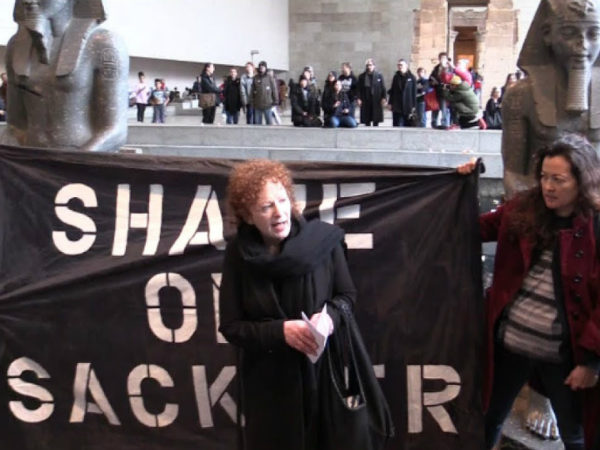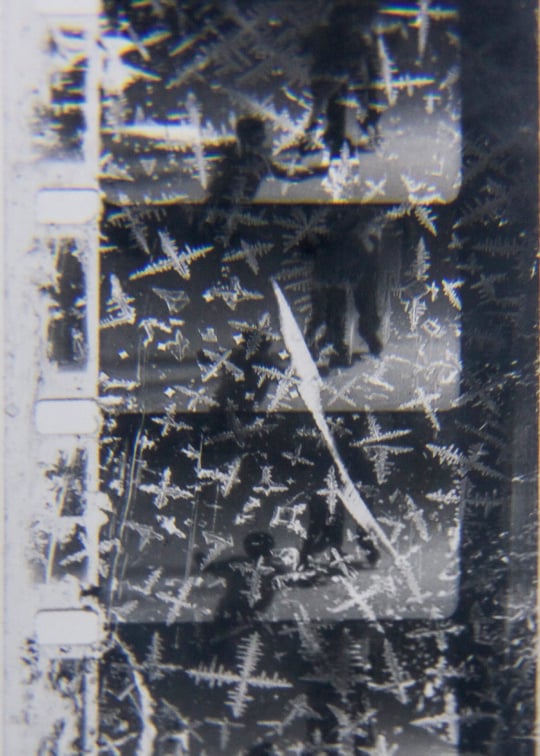
Earlier this week, it was announced that businessman Richard Sackler was involved in securing a patent for Buprenorphine, a newly updated drug produced by Rhodes Pharma that could combat opioid addiction. Sackler was recently called an “opioid billionaire” by the Financial Times because of the role his family’s pharmaceutical company, Purdue Pharma, best known for developing Oxycontin, played in fueling and profiting from the present public health crisis surrounding such drugs. Days later, it was revealed in another Financial Times report that the Sackler family also owns Rhodes Pharma. Whether patients are addicted to opioids or fighting that addiction, it appears that the Sacklers want a piece of the action.
In response to news of the patent, photographer Nan Goldin issued a statement co-written with activist and author Ryan Hampton of the Voices Project and activist art collective Queer Appalachia to Artnet News.
The statement reads, in part, “It is evil to profit from deliberately making people sick, then selling them a ‘cure’ for their illness. This bait and switch has put millions of dollars in the Sackler family’s pockets, and hundreds of thousands of Americans into the ground… We demand that the patent be released so that generic drug makers can produce and sell Buprenorphine for pennies, to people in need. We demand that addiction be treated not as a moral failing, but as a chronic illness like diabetes.”

Most well known for her autobiographical 1985 slideshow exhibition and 1986 artist’s book The Ballad of Sexual Dependency, which documents moments of intimacy and pain among New York subcultures that included many heroin users, Goldin has been a vociferous participant in public discussions of the current opioid crisis. In January, she founded the activist group P.A.I.N. (Prescription Addiction Intervention Now), on whose behalf she issued this week’s statement to Artnet News. According to Artnet News, Goldin was herself previously addicted to Oxycontin “for years after being prescribed it for a wrist injury.” In March, Goldin and P.A.I.N. staged a protest in the Metropolitan Museum of Art’s Sackler Wing, which is named after the Purdue Pharma family, as is the Guggenheim Museum’s Sackler Center for Arts Education. Hyperallergic has published a complete list of cultural institutions and initiatives funded by the family.

Queer Appalachia, the West Virginia-based collective that cowrote the statement, launched in 2016 as an Instagram account to promote the queer, Appalachia-focused zine Electric Dirt. Since then, that Instagram account has garnered over 73 thousand followers and Queer Appalachia has become an important resource for individuals—but especially queer Southerners and ex-Southerners—looking for inclusive, social justice-oriented narratives about the region.
Read the full statement issued by P.A.I.N., the Voices Project, and Queer Appalachia below:
The news that Richard Sackler, a member of Purdue’s Sackler family has received a patent for a “new and improved” Buprenorphine comes as no surprise, but is still alarming. They are profiting off the crisis that they subsidized with their most profitable pill, OxyContin. This is reprehensible and shows a lack of any moral conscience. Maybe they can patent a funeral parlor next.
The Sackler family has made billions from OxyContin, one of the strongest and most addictive opioid drugs on the market — manufactured by their company Purdue Pharma. Friday, they announced that they will obtain a patent for Buprenorphine, a life-saving addiction treatment medication. And just Sunday, it was revealed that The Sacklers have surreptitiously profited through sales of alternative generic opioids through their small company in Rhode Island since 2007. As the Financial Times Reports, Purdue claimed they’re only responsible for 1.7% of opioid prescriptions in the US, but we now know that the companies combined are responsible for a 6% total share of the opioid market. The Sacklers own their competitors.
Purdue helped create the opioid crisis by disseminating misleading marketing materials, giving fake “educational” seminars to prescribers, and buying politicians and officials who oversee drug policies. Now, Purdue is reaping what it has sown: more blood money. Forced to limit their sales of OxyContin, they search for other predatory ways to make profit, including a global company which seeks to make the world addicted — Mundipharma.
There is only one acceptable solution. Any and all antidotes for opiate addiction developed by any member of the Sackler family, Purdue Pharma, or any person who has been affiliated with them, should be given for free to all who suffer from drug addiction.
It is evil to profit from deliberately making people sick, then selling them a “cure” for their illness. This bait and switch has put millions of dollars in the Sackler family’s pockets, and hundreds of thousands of Americans into the ground. Many of the people affected by the opioid crisis are in rural, low income, industrial communities. They already carry the burden of overwhelming overdose rates, morgues that are filled with sons and daughters’ bodies, and crime, disease, and unemployment. Allowing the Sackler family to whitewash Purdue’s mess is hideously cruel and insurmountably cynical.
We demand that the patent be released so that generic drug makers can produce and sell Buprenorphine for pennies, to people in need. We demand that addiction be treated not as a moral failing, but as a chronic illness like diabetes. There are philanthropists who have spent their immorally gained money to rectify solutions to the damage they’ve done. The polio vaccine was made freely available by its creator, Jonas Salk. It is estimated that, by surrendering his patent, he forfeited $7 billion in revenue. Yet, because of his willingness to put people before profits, we live in an America where children no longer suffer from paraplegia and paralysis. Since 1955, polio has been nearly extinct.
Medical philanthropy, not profits, must be the next step. We absolutely support scientific discoveries that will help aid those who suffer from the illness of addiction.
The only thing that matters of course is that the Sacklers, Purdue Pharma, and other drug makers don’t benefit from such discoveries. They have no right to profit off of the damage done. They should be urgently seeking to develop non addictive alternative drugs for pain. Addiction affects many of us: Buprenorphine should be freely available to all. OxyContin should not be a “gateway drug” for Purdue’s other products. Recovery must belong to people, not corporations who cause and profit off our pain.
Shame on the Sacklers and shame on the federal government.
By: P.A.I.N., Ryan Hampton & Queer Appalachia




